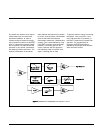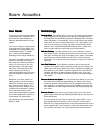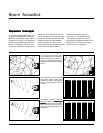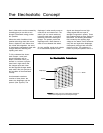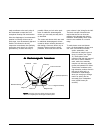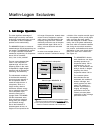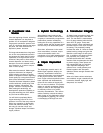
Page27
Monolith III User's Manual
2. Curvilinear Line2. Curvilinear Line
2. Curvilinear Line2. Curvilinear Line
2. Curvilinear Line
Source Source
Source Source
Source
Since the beginning of Audio, achieving
smooth dispersion has long been a
problem for all loudspeaker designers.
Large panel transducers present even
more of a challenge because the larger
the panel, the more directional the
dispersion pattern becomes.
Full range electrostats have long been
one of the most problematic transduc-
ers because they attain their full range
capabilities via a large surface area. It
looked as if they were in direct conflict to
smooth dispersion and almost every
attempt to correct this resulted in either
poor dispersion or a serious compro-
mise in sound quality.
After extensive research, Martin-Logan
engineers discovered an elegantly
simple solution to achieve a smooth
pattern of dispersion without degrading
sound quality. By curving the horizontal
plane of the electrostatic transducer, a
controlled horizontal dispersion pattern
could be achieved, yet the purity of the
almost massless electrostatic dia-
phragm remained uncompromised.
After creating this technology, we
developed the production capability to
bring this technology out of the labora-
tory and into the market place.
You will find this proprietary Martin-
Logan technology used in all of our
products. It is one of the many reasons
behind our reputation for high quality
sound with practical usability. This is
also why you see the unique "see
through" cylindrical shape of all Martin-
Logan products.
3. Hybrid Technology3. Hybrid Technology
3. Hybrid Technology3. Hybrid Technology
3. Hybrid Technology
When Martin-Logan introduced the
Monolith back in 1982, it was the first
company to commercially recognize the
performance potential available by
mating the air-moving capabilities of a
dynamic woofer with the inherent speed
and accuracy of an electrostatic panel.
Since then, refinements in the actual
driver assemblies, crossover compo-
nents, and materials used in the
construction of our hybrid speakers have
brought this concept to its full potential.
4. Vapor Deposited4. Vapor Deposited
4. Vapor Deposited4. Vapor Deposited
4. Vapor Deposited
FilmFilm
FilmFilm
Film
The diaphragm material used in all
Martin-Logan speakers employs an
extremely sophisticated conductive
surface that has been vapor deposited
on the polymer surface at an atomic
level. Copper oxide and palladium have
been vaporized and electrostatically
driven into the surface of the polymer
film in a vacuum chamber. This process
allows an optically transparent surface
adding no mass to the diaphragm that
is extremely uniform in its surface
resistivity characteristics. This uniform
surface resistivity controls the electro-
static charge on the diaphragm surface
and regulates its migration. As a result,
no discharging or “arcing” can occur.
5. Transducer Integrity5. Transducer Integrity
5. Transducer Integrity5. Transducer Integrity
5. Transducer Integrity
All Martin-Logan transducers begin with
two pieces of high grade, cold rolled
steel. The rear stator is manufactured
from 16 gauge material while the front
stator from 18 gauge. These steel
pieces are then custom perforated and
insulated with an exotic nylon compos-
ite coating. This proprietary coating
insulates the stator to 3 times its actual
needed working voltage and gives the
Monolith a wide margin of safe opera-
tion. In addition to the electrical insula-
tion properties, this coating also
provides the Monolith with a durable,
attractive finish that dampens the steel
to prevent ringing. These pieces are
then sandwiched with our exclusive
vapor deposited diaphragm and
spacers into a curved geometry and
bonded together with aerospace
adhesives whose strength exceeds that
of welding.
When all of these various techniques
are combined, we get a transducer that
is attractive, durable, highly rigid, well
dampened, and neutral.



